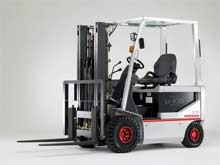Nissan has debuted a new forklift concept at CeMAT 2008 in Hannover, Germany. 'So what?' you may think, what does that have to do with a car enthusiast website? This new Nissan forklift is powered by Nissan's all new Li-ION batteries, the same ones which will be powering Nissan's Denki Cube Electric Vehicle (EV).
The advanced Li-ION battery technology is developed by Automotive Energy Supply Corporation (AESC), a joint venture between Nissan and NEC, and was first seen on the Nissan Mixim concept car at the Frankfurt Motor Show and is also featured in the Nissan PIVO 2 concept car.
The Li-ION battery is still in development and is expected to make its production debut in the forklift sometime in 2009 before hitting the big time in 2010 when Nissan plans to market an EV usign the technology in Japan and the USA. By 2012 Li-ION powered electric cars should be on the roads globally.
Environmental advantages
• Zero emission and no harmful materials used in the battery.
• Li-ION technology does not use restricted pollutants such as cadmium, lead, mercury or sulfuric acid. As there are no gas emissions during charging, there is no need for dedicated charging bays.
• Less energy consumption (less CO2).
Operational advantages (Comparison with conventional lead-acid type battery)
• Quick Charge
Charging a Li-ION battery is quicker and allows for longer operational hours. It makes operations more flexible and reduces the need for additional batteries.
• Maintenance Free
Maintenance is virtually zero as there is no need for refilling of the battery cells with water as normally required for lead-acid batteries.
• High Power...Li-ION batteries offer significant more power and energy, resulting in better performance and higher uptimes.
• Long Life..After some time the polar plates of a conventional lead-acid battery become sulphated. It causes high resistance and extreme difficulty to recharge again. The almost perfect reversible reaction process between electrons and Li-ion does not cause this type of “waste”. It results in a longer battery life which reduces replacement investments considerably.
• Compact...Size of Li-ION batteries can be reduced dramatically against conventional lead-acid batteries of the same capacity, allowing for flexible design and arrangement in the forklift truck.
• Excellent (Dis)charge Performance
• During charging and discharging there is less energy loss and less energy is needed to fully charge the Li-ION battery. Extended working time also results from larger recovering energy from regenerative braking.

